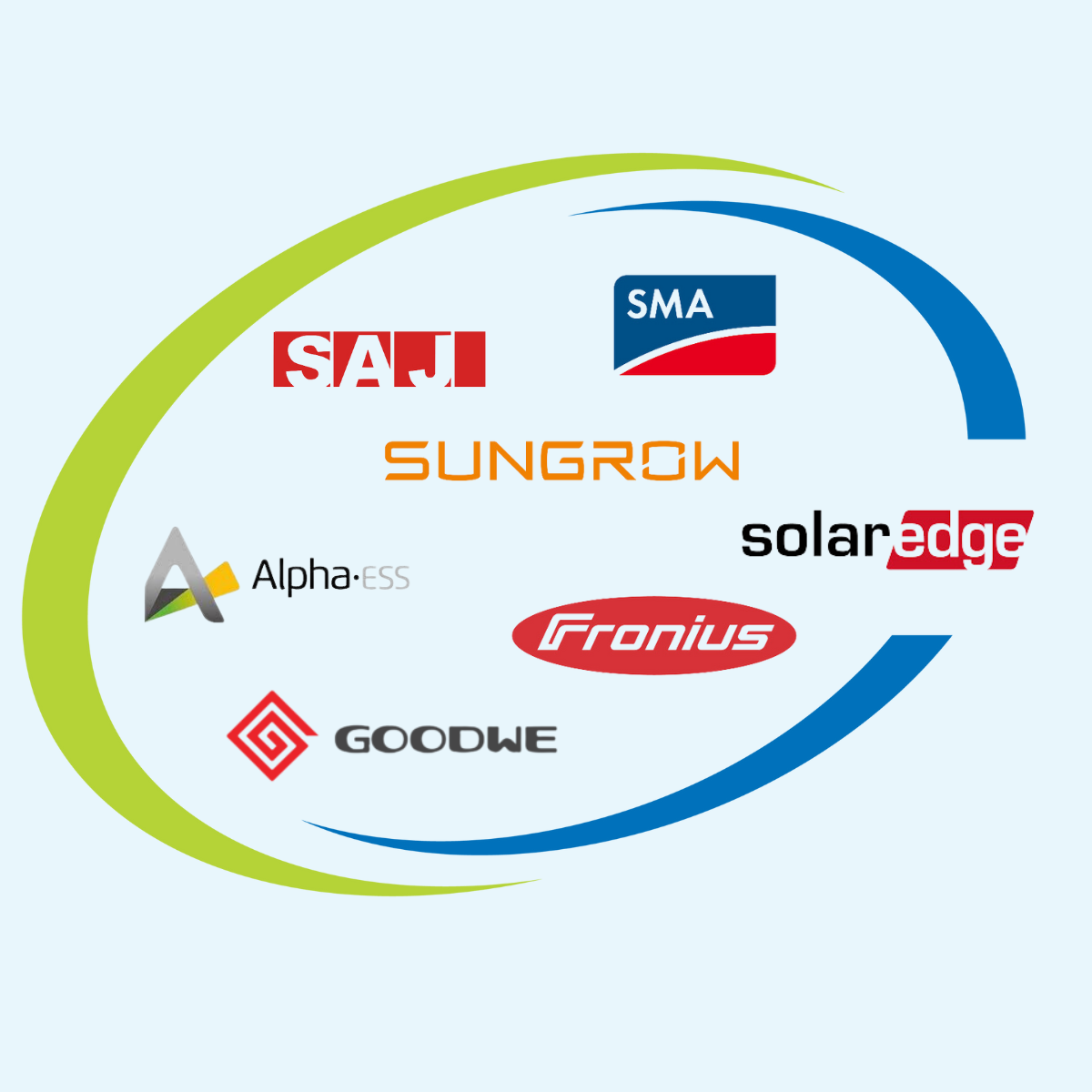The ‘CIRCLE OF TRUST’ for DC Coupled Solutions
With our decade’s worth of experience, we have worked with numerous manufacturers, obviously, some have performed better than others and have really stood out to us. Our ‘CIRCLE OF TRUST’ represents the manufacturers that we recommend and are comfortable installing on our own properties.
Please click on a manufacturer’s logo to be taken to a page dedicated to them and the products they offer for your DC-coupled battery solution.

At Renewables4U, we believe in keeping our readers informed about the latest advancements in the renewable energy sector.
Hybrid Inverters
A hybrid inverter, also known as a multi-mode inverter, is an essential part of a hybrid solar power system. Unlike traditional inverters, which are used in grid-tied solar systems, the hybrid inverter has the capability to manage both grid-connected and off-grid operations. It can intelligently switch between using solar power, stored battery power, and grid power to ensure a seamless electricity supply.
One of the key features of a hybrid inverter is its ability to manage excess solar energy. When the solar panels generate more electricity than you are currently using, the excess power can be sent to the batteries for storage instead of being fed back to the grid.
This stored energy can then be utilised during the night or when the demand exceeds the solar generation. By using this intelligent energy management system, hybrid inverters maximise self-consumption and reduce dependence on external power sources.
Moreover, hybrid inverters also provide backup power during periods of grid outages. In case of a power failure, the inverter automatically disconnects from the grid and switches to battery power, ensuring a continuous and uninterrupted electricity supply to your home or business.
DC-Coupled Batteries
A DC-coupled battery system is an energy storage solution integrated with a hybrid solar power system. These batteries store excess electricity produced by the solar panels in DC form. Unlike AC-coupled batteries, which require additional conversion steps, DC-coupled batteries directly store the energy as it is. This reduces energy losses and improves the overall efficiency of the system.
One of the main advantages of a DC-coupled battery system is that it allows for efficient charging and discharging of the batteries. Since the batteries are connected directly to the solar panels, any excess solar power that is not being used is efficiently stored in the batteries. This energy can then be utilised during periods of low solar generation or even during blackouts.
DC-coupled batteries also offer system flexibility. They can be designed to accommodate various battery chemistries and sizes, giving users the freedom to choose the most suitable option for their specific needs.
5 Benefits of Installing a DC Coupled Battery
Renewable energy sources like solar and wind power have revolutionized the way we generate electricity. As more and more households and businesses embrace clean and green energy, the need for efficient energy storage solutions has become paramount.
Among the various options available, installing a DC coupled battery system offers several benefits. Here are five key advantages:
1. Increased Efficiency:
A DC coupled battery system allows for seamless integration with solar photovoltaic (PV) systems. By directly connecting the battery to the DC output of the solar panels, the DC coupled battery system eliminates the need for additional power electronics, such as inverters.
This improves the overall energy efficiency of the system and reduces unnecessary conversions, ultimately resulting in higher energy yields and lower energy losses.
2. Optimised Self-Consumption
One of the major advantages of a DC coupled battery system is the ability to store excess solar energy for use during periods of low generation or high demand. By capturing surplus energy directly from the solar panels in DC form, the battery system can efficiently store and discharge the power when needed.
This maximizes self-consumption, reduces reliance on the grid, and minimizes energy bills, offering significant cost savings to users.
3. Backup Power Supply
Another key benefit of a DC coupled battery system is its ability to provide backup power during grid outages. When the main power supply fails, a DC coupled battery can seamlessly switch to feeding power to critical loads, ensuring uninterrupted operation of essential appliances or equipment.
This can be particularly advantageous for households, commercial facilities, or remote installations where a consistent power supply is crucial.
4. System Scalability
DC coupled battery systems provide greater flexibility when it comes to expanding or modifying the existing energy storage capacity. As the demand for electricity grows or as the size of solar installations increases, the scalable nature of these systems allows for incremental additions of battery capacity, without requiring major modifications to the infrastructure. This makes it easier and more cost-effective to adapt to changing energy needs in the future.
5. Longevity and Reduced Maintenance
DC batteries, particularly lithium-ion batteries, offer longer lifespans compared to AC-coupled alternatives. By avoiding AC to DC conversions, DC coupled battery systems reduce stress on the batteries, resulting in prolonged longevity.
Additionally, these systems often come with advanced battery management systems that optimize battery operations, prolonging their lifespan further. The reduced maintenance requirements translate into less hassle and lower operating costs for the users.




